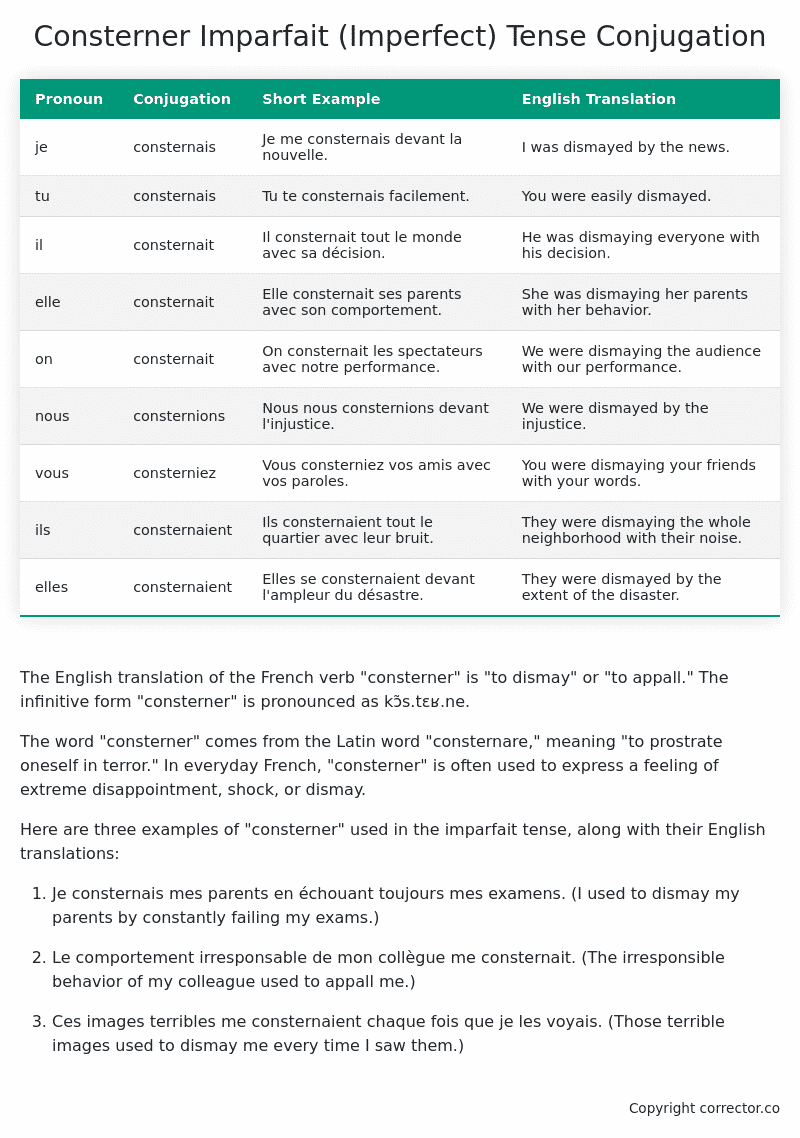Imparfait (Imperfect) Tense Conjugation of the French Verb consterner
Introduction to the verb consterner
The English translation of the French verb “consterner” is “to dismay” or “to appall.” The infinitive form “consterner” is pronounced as kɔ̃s.tɛʁ.ne.
The word “consterner” comes from the Latin word “consternare,” meaning “to prostrate oneself in terror.” In everyday French, “consterner” is often used to express a feeling of extreme disappointment, shock, or dismay.
Here are three examples of “consterner” used in the imparfait tense, along with their English translations:
-
Je consternais mes parents en échouant toujours mes examens.
(I used to dismay my parents by constantly failing my exams.) -
Le comportement irresponsable de mon collègue me consternait.
(The irresponsible behavior of my colleague used to appall me.) -
Ces images terribles me consternaient chaque fois que je les voyais.
(Those terrible images used to dismay me every time I saw them.)
Table of the Imparfait (Imperfect) Tense Conjugation of consterner
| Pronoun | Conjugation | Short Example | English Translation |
|---|---|---|---|
| je | consternais | Je me consternais devant la nouvelle. | I was dismayed by the news. |
| tu | consternais | Tu te consternais facilement. | You were easily dismayed. |
| il | consternait | Il consternait tout le monde avec sa décision. | He was dismaying everyone with his decision. |
| elle | consternait | Elle consternait ses parents avec son comportement. | She was dismaying her parents with her behavior. |
| on | consternait | On consternait les spectateurs avec notre performance. | We were dismaying the audience with our performance. |
| nous | consternions | Nous nous consternions devant l’injustice. | We were dismayed by the injustice. |
| vous | consterniez | Vous consterniez vos amis avec vos paroles. | You were dismaying your friends with your words. |
| ils | consternaient | Ils consternaient tout le quartier avec leur bruit. | They were dismaying the whole neighborhood with their noise. |
| elles | consternaient | Elles se consternaient devant l’ampleur du désastre. | They were dismayed by the extent of the disaster. |
Other Conjugations for Consterner.
Le Present (Present Tense) Conjugation of the French Verb consterner
Imparfait (Imperfect) Tense Conjugation of the French Verb consterner (You’re reading it right now!)
Passé Simple (Simple Past) Tense Conjugation of the French Verb consterner
Passé Composé (Present Perfect) Tense Conjugation of the French Verb consterner
Futur Simple (Simple Future) Tense Conjugation of the French Verb consterner
Futur Proche (Near Future) Tense Conjugation of the French Verb consterner
Plus-que-parfait (Pluperfect) Tense Conjugation of the French Verb consterner
Passé Antérieur (Past Anterior) Tense Conjugation of the French Verb consterner
Futur Antérieur (Future Anterior) Tense Conjugation of the French Verb consterner
Subjonctif Présent (Subjunctive Present) Tense Conjugation of the French Verb consterner
Subjonctif Passé (Subjunctive Past) Tense Conjugation of the French Verb consterner
Subjonctif Imparfait (Subjunctive Imperfect) Tense Conjugation of the French Verb consterner
Subjonctif Plus-que-parfait (Subjunctive Pluperfect) Tense Conjugation of the French Verb consterner
Conditionnel Présent (Conditional Present) Tense Conjugation of the French Verb consterner
Conditionnel Passé (Conditional Past) Tense Conjugation of the French Verb consterner
Conditionnel Passé II (Conditional Past II) Tense Conjugation of the French Verb consterner
L’impératif Présent (Imperative Present) Tense Conjugation of the French Verb consterner
L’impératif Passé (Imperative Past) Tense Conjugation of the French Verb consterner
L’infinitif Présent (Infinitive Present) Tense Conjugation of the French Verb consterner
L’infinitif Passé (Infinitive Past) Tense Conjugation of the French Verb consterner
Le Participe Présent (Present Participle) Tense Conjugation of the French Verb consterner
Le Participe Passé (Past Participle) Tense Conjugation of the French Verb consterner
Struggling with French verbs or the language in general? Why not use our free French Grammar Checker – no registration required!
Get a FREE Download Study Sheet of this Conjugation 🔥
Simply right click the image below, click “save image” and get your free reference for the consterner imparfait tense conjugation!

Consterner – About the French Imparfait Tense
NOTE: To take a deep dive into all the French tenses then see our article on Mastering French Tense Conjugation.
Formation of the Imparfait Tense
For regular -er verbs:
For regular -ir verbs
For regular -re verbs
Common Everyday Usage Patterns
Description of Past Habits
Background Information
Mental and Emotional States
It’s employed to express emotions, thoughts, or physical sensations in the past. For example: “J’étais content quand il est arrivé.” (I was happy when he arrived.)
Ongoing Actions
Points to Note About the Imparfait Tense
Passé Composé vs. Imparfait
Conditional
Si Clauses
Narration
I hope you enjoyed this article on the verb consterner. Still in a learning mood? Check out another TOTALLY random French verb imparfait conjugation!


